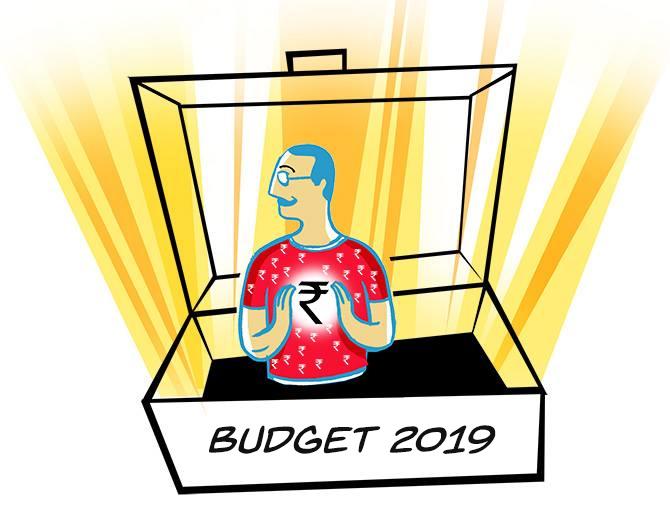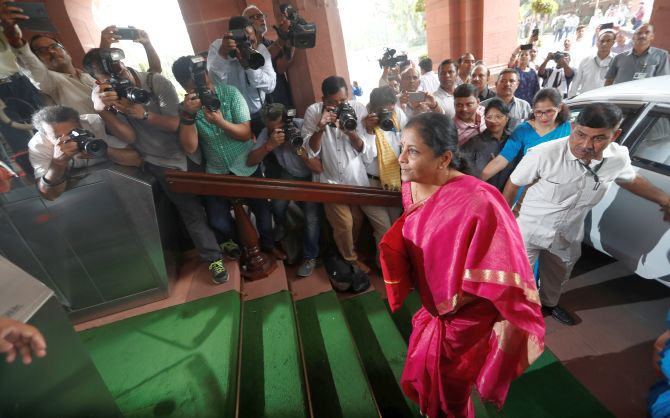The Budget is impressive in its clarity on both the destination and the direction, says Rashesh Shah.
Illustration: Dominic Xavier/Rediff.com

The Budget is impressive in its clarity on both the destination and the direction.
The long-term economic goal to reach $5 trillion by 2024 has not affected its priority of addressing challenges like the economic slowdown, market apprehensions on NBFCs, and the revenue shortfall.
Finance Minister Nirmala Sitharaman’s first Budget is “progressive and visionary”.
The FM has gone in for long-term structural reform calls such as FDI hike in several sectors including aviation and insurance, reforms in the power sector, rural housing and roads, and special announcements in affordable housing.
In fact, the infrastructure thrust -- with a defined time frame and a greater role for the private sector -- is comprehensive and inclusive.
The proposal to trim taxes on companies with a turnover of up to Rs 400 crore to 25 per cent is much welcome.
I believe this is the way forward for the country to have a globally compatible corporate tax structure and rate.
Some pre-Budget issues included the challenge to contain the fiscal deficit and public sector bank recapitalisation.
The FM seems confident to keep the fiscal deficit target to 3.3 per cent for the current fiscal year (from the earlier estimate of 3.4 per cent of GDP) despite widespread expectations to the contrary.
I think the divestment target and flows from foreign investors hold the key to the overall optimism.
Similarly, in the case of public sector bank recapitalisation, between FY18 and FY19, the government had pumped in Rs 1.96 lakh crore, and this Budget boosts it by another Rs 70,000 crore.
The move to increase the minimum shareholding of listed companies to 35 per cent has been a surprise and the impact needs to be seen.
The urgency to restore liquidity in the NBFC sector seems to have been dealt with in a more structured way; banks will be allowed to buy highly rated pooled assets of financially sound NBFCs, amounting to Rs 1 lakh crore, under the pool purchase programme.
Against this, the government has promised banks to provide a one-time six-month partial credit guarantee for the first loss of up to 10 per cent.
NBFCs are critical for the long-term growth of India, hence the message to support sound NBFCs sends strong signals to the banking and mutual fund industry.
The industry is also keenly awaiting clarity on the proposed strengthening of RBI powers, which will help improve governance and oversight, thereby further boosting confidence.
The Budget has sought to divest regulatory powers from the National Housing Bank to the RBI as the banking sector regulator is more agile and aware of the overall financial sector issues as well as economic significance.
The efforts to continue rural distress minus cash dole-outs is another notable move; improvement to rural infrastructure and programmes like “one nation, one grid” are always efficient ways of rural inclusion.
Much on the expected lines, the government has given more thrust to affordable housing; from giving infrastructure status in the previous Budget to the exemption of Rs 1.5 lakh in income tax -- in addition to the existing benefits -- on home loans of up to Rs 45 lakh, it will benefit a broader segment of home-buyers and increase demand.
However, the benefit is being limited to housing loans till March 2020 -- which could have been extended.
The success of reforms like the GST, IBC and RERA is definitely encouraging and augurs well for the country’s future.
Clearly, the Reform, Perform and Transform policy of the government is working well.
This year’s most impressive catch-phrase has been “Naari tu Narayani” -- a clear exhortation to include more women into economic activities.
This has made the Budget more holistic and all-inclusive.
Rashesh Shah is chairman & CEO of Edelweiss Group.










